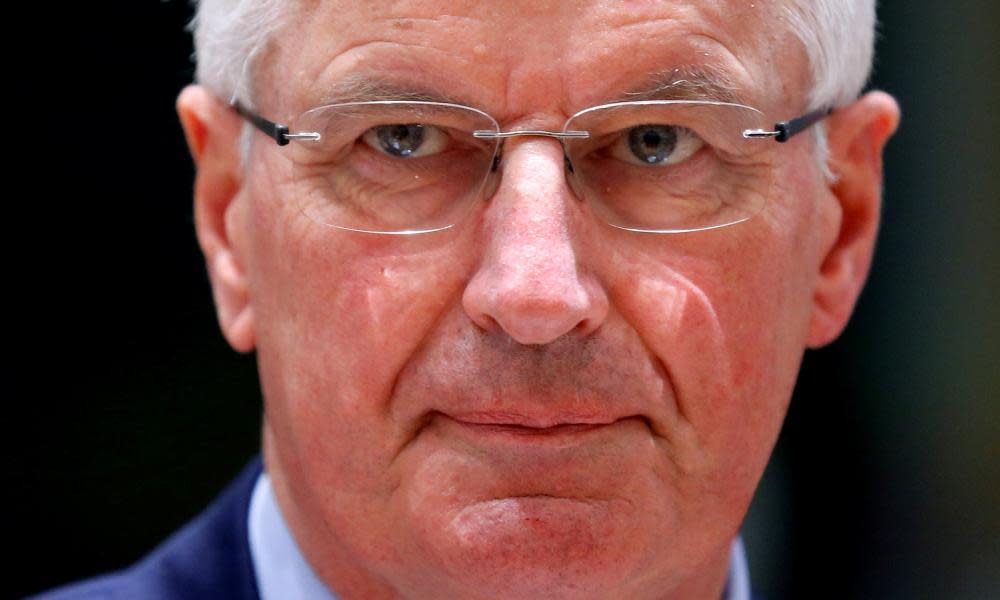May playing 'hide and seek' in Brexit talks, Barnier says

Theresa May has been accused of playing “hide and seek” in the Brexit talks and attempting to pin the blame for the damaging consequences on Brussels, in a damning speech by the EU’s chief negotiator, Michel Barnier.
After a fraught week of negotiations, during which the UK declined to spell out its proposed solution for avoiding a hard border with Ireland or offer positions on a range of crucial issues, Barnier gave a withering assessment of the prime minister’s approach.
He suggested that the UK was seeking to blame the EU for the problems that have emerged in recent days, from the shutting out of British firms from the £8bn Galileo satellite project to the rejection of the UK’s proposed retention of the powers of the European arrest warrant and continued say in the shaping of data laws.
But the former French minister told a conference of lawyers in Portugal on Saturday that the UK now needed to offer a “realistic” vision of the future and own up to the consequences of its own decisions.
A customs union is an agreement by a group of countries, such as the EU, to all apply the same tariffs on imported goods from the rest of the world and, typically, eliminate them entirely for trade within the group. By doing this, they can help avoid the need for costly and time-consuming customs checks during trade between members of the union. Asian shipping containers arriving at Felixstowe or Rotterdam, for example, need only pass through customs once before their contents head to markets all over Europe. Lorries passing between Dover and Calais avoid delay entirely.
Customs are not the only checks that count – imports are also scrutinised for conformity with trading standards regulations and security and immigration purposes – but they do play an important role in determining how much friction there is at the border. A strict customs regime at Dover or between Northern Ireland and the Republic of Ireland would lead to delays that will be costly for business and disruptive for travellers. Just-in-time supply chains in industries such as car making could suffer. An Irish peace process built around the principle of entirely unfettered travel between north and south could be jeopardised.
The speed of the talks needed to be accelerated, Barnier said, adding that without a solution to the issue of the border between Northern Ireland and the Irish Republic there would be no overall deal or a transition period to shield UK companies from a cliff-edge Brexit on 29 March 2019.
“If the United Kingdom would like to change its own red lines, it will have to tell us. The earliest would be best,” he said.
“And, of course, we are open. There is no ideology or dogmatism on our part. The European council has made it clear that the UK can change its mind. We simply ask for clarity.
“Because to negotiate effectively, you must know what the other party wants. A negotiation cannot be a part of hide and seek.”
He added: “We need realistic proposals from the UK. Proposals that respect the institutional architecture and the integrity of the European Union.
“I can see the temptation of the blame game to bring the negative consequences of Brexit on the European Union. But we will not be impressed. I will not be impressed.
“It is the United Kingdom that leaves the European Union. It cannot, on leaving, ask us to change who we are and how we operate.”
Barnier said the UK wanted to both change the bloc and have a say in EU matters after Brexit. But he told the lawyers in the audience that “these British ideas pose real problems”.
He said: “The United Kingdom must look the reality of the European Union in the face. It must also face the reality of Brexit.
“For the economy, for foreign policy, the best way to influence the decisions of the European Union is to be in the European Union. The United Kingdom wants to leave. It is its decision. Not ours.”
Last week the British negotiating team proposed that the UK’s Information Commissioner’s Office (ICO), the largest data protection authority in the EU, sit on the body that will regulate the new GDPR data rules.
It also wishes to be part of the “one-stop shop” mechanism, whereby only one supervisory authority, rather than multiple bodies across the EU, decides on cross-border data disputes, so at to give EU and UK firms greater certainty.
But, Barnier said that such privileged access would impact on the EU’s ability to make its own decisions.
He said: “Let’s be clear: Brexit is not and will never be in the interest of EU companies. And above all it would be contrary to the interests of our companies to give up our autonomy of decision.
“This autonomy allows us to set standards for the whole of the EU but also often to see these standards taken over the world.
“It is the normative power of the union or what is often called ‘the Brussels effect’. And we cannot, we will not be able to share this decisional autonomy with a third country, undoubtedly a former member state but which no longer wants to be in the same legal ecosystem as us.”

 Yahoo News
Yahoo News 
